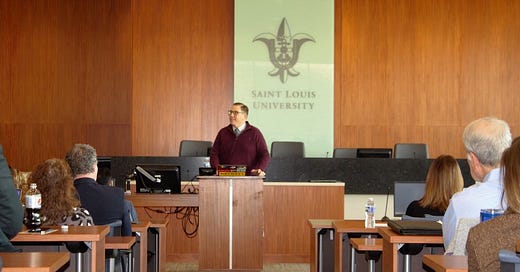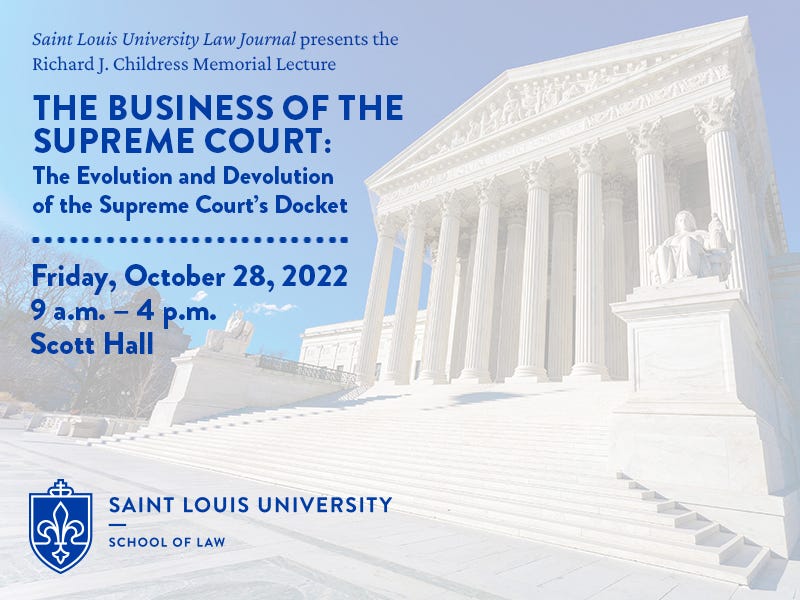Bonus 20: How We Do, Don't, and Should Talk About SCOTUS
This week's bonus content offers a sneak peek of a forthcoming article, which looks backward to make the case for fundamentally reconceiving contemporary public discussions about the Supreme Court
Welcome back to the weekly bonus content for “One First.” Although Monday’s regular newsletter will remain free for as long as I’m able to do this, much of Thursday’s content is behind a paywall to help incentivize those who are willing and able to support the work that goes into putting this newsletter together every week. I’m grateful to those of you who are already paid subscribers (and hope those of you who aren’t will consider upgrading your subscription, both to receive the full bonus content and to support the effort more generally).
As one of the bonus features, I plan to regularly post “sneak peeks” of coming attractions. The first of these was the “book trailer” for my forthcoming book on “The Shadow Docket.” This week, I’m posting the introduction to my forthcoming article in the Saint Louis University Law Journal, titled “The Business of the Supreme Court: How We Do, Don’t, and Should Talk About SCOTUS.”
The article is a (heavily) edited version of the 2022 Richard J. Childress Memorial Lecture, which I had the honor of giving at SLU last October (and for which there is video). The final version is due out later this spring.
As I noted at the time, I’m grateful to Professor Sam Jordan at SLU and Mikayla Lewison from the SLU Law Journal (and the SLU Class of 2023) for the invitation—and to a fantastic list of friends and colleagues who participated in the panels after the lecture.
The Business of the Supreme Court: How We Do, Don’t, and Should Talk About SCOTUS, 67 St. Louis U. L.J. (forthcoming 2023)
Abstract
Any holistic assessment of the contemporary Supreme Court tends to focus largely (if not exclusively) on the Court’s “merits docket”—the sixty-ish signed opinions in argued cases that the Justices hand down each Term. Given recent developments, that focus is unsurprising. But as Professor Vladeck argues in the 2022 Richard J. Childress Memorial Lecture, it is also alarmingly myopic, and tells a deeply unhelpful and skewed story about the current Court as an institution. Such a narrative doesn’t just ignore the rest of the Court’s output—including the increasingly significant substance of the “shadow docket”; it also marginalizes other less case-driven symptoms of institutional disease, signs that were everywhere to be found during the October 2021 Term.
Harkening back to then-Professor Felix Frankfurter’s more-holistic annual assessments of the Supreme Court between 1925 and 1938, Vladeck’s lecture argues that our contemporary focus on the merits docket as the sum total of what is important about the Supreme Court is problematic in at least three distinct respects. First, focusing on the most ideologically divisive features of the Court’s work (high-profile merits decisions) reinforces charges of polarization and partisanship, because, from the public’s perspective, an ever-increasing majority of news and academic discussion of the Court involves cases in which the Justices have sorted into their “normal” camps.
Second, because the focus on the merits docket has obscured discourse about the Court’s relationship with other constituencies, that shift has also reinforced both the perception and the reality that the Court is isolated (and has isolated itself) from other government institutions—to a degree unheard of at any earlier point in our history. And third, because we have become so bad at talking about the Court as an institution, we have also lost the facility for talking about how to make the Court healthier in ways that are not intensely and inevitably polarizing.
Vladeck’s lecture aims to provoke a meaningful public conversation about how we do, don’t , and should think, write, and talk about the Supreme Court as an institution—in ways that might make it that much more possible and politically palatable to talk about how to fix it.
Part I: Felix Frankfurter and “The Business of the Supreme Court”
Keep reading with a 7-day free trial
Subscribe to One First to keep reading this post and get 7 days of free access to the full post archives.





